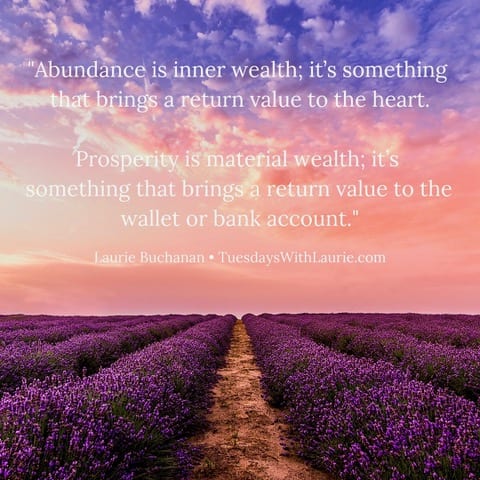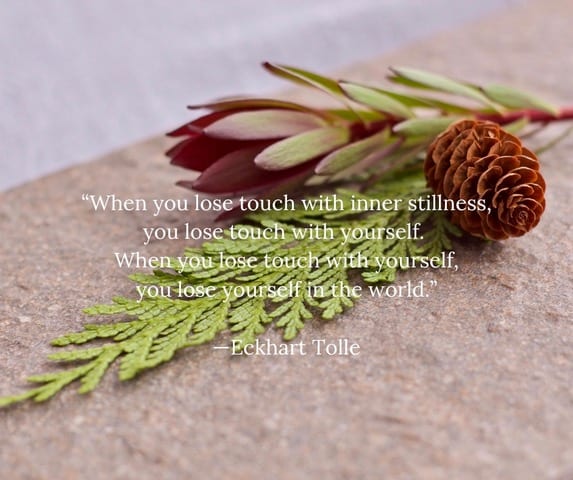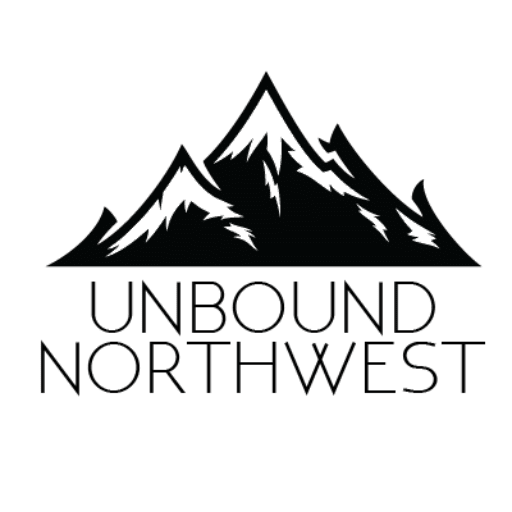The following thought-provoking questions are not meant for quick yes or no answers, so enjoy a cup of coffee or tea while you contemplate and write your responses.
- Are you willing to invest in yourself?
- Are you willing to become stronger than your history?
- Are you willing to forgive yourself?
- Are you willing to forgive others?
- Are you willing to stop being held hostage by the opinion of others?
- Are you willing to be motivated by trust instead of fear?
- Are you willing to let go of anger?
- Are you willing to let go of your need to control?
- Are you willing to know the truth?
- Are you willing to be transformed?
- Are you willing to function from a place of authenticity?
- Are you willing to live an inspired life?
If you answered yes to these questions, you’re ready to live an abundant life. Many people use the terms “abundance” and “prosperity” interchangeably. But they’re different. Let’s take a look at the difference:
Abundance is inner wealth; it’s something that brings a return value to the heart. It benefits your inner self with intangible dividends. Examples include love, peace of mind, health, wellness, wisdom, integrity, respect, quality relationships, joy, gratitude, humor, a positive attitude, and contentment—being satisfied.

When I asked my friend Christine how her father’s brain surgery went, she responded, “My dad’s surgery went awry, and they almost lost him. His heart stopped for four minutes after the apparatus on his head turned his neck in such a way that his breathing was cut off. He’s got a strong heart, for being seventy-six, and the doctors are so confident, and so is he, that they’re going to do the surgery again in three weeks. They feel that they at least found the area that will work in this last operation before all heck broke loose in the operating room.
“My dad’s a positive sort, so he was kidding very soon about ‘seeing the light and coming back.’ My mother was less enthusiastic, of course. She got quite a scare, as we all did.
“But he’s at home, resting up now for the next version of the surgery in three weeks. He’s a dogged kind of guy—he never gives up—and he also always laughs about these things in life. Truly a man to admire.”
Christine’s father is a perfect example of someone with a storehouse of abundance—inner wealth.
Prosperity is material wealth; it’s something that brings a return value to the wallet and/or bank account. It’s on the outside of self and has tangible dividends. You can touch it, hold it, drive it, live in it, wear it, swim in it, take it to the bank, or invest it. Examples include money, jewelry, real estate, cars, boats, recreational vehicles, collections, and investments.

One of my clients, Hank, has an eight-thousand-square-foot house and a second home, of over ten thousand square feet. Both residences contain boxes of purchased items that are yet to be opened because he already has so much “stuff.”
He owns multiple luxury vehicles and drives a different one to each of his weekly appointments, depending on his mood; sometimes it’s the Bentley, other times it’s the Hummer, and sometimes it’s the vintage Cadillac he had restored for Sally, his wife. When he’s feeling casual, it’s the souped-up pickup with a five-hundred-cubic-inch engine, and when the weather’s really nice, he rides his favorite motorcycle, a custom Indian Chief.
A person can have abundance and not prosperity, or a person can be prosperous and not have abundance. A person can be both or neither.
Dr. Wayne Dyer said, “Abundance is not something we acquire. It is something we tune into.” In other words, abundance is a state of being. All we need to do is learn how to connect with it, but it’s all too easy to let life’s clutter—internal and external—define our days, to become the critical factor in the choices we make.
In his book, The Geography of Bliss: One Grump’s Search for the Happiest Places in the World, Eric Weiner tells us that the size of a person’s bank account doesn’t really have that much of an impact on a person’s happiness quotient. For instance, a person who’s sitting in first class isn’t necessarily happier than those of us in coach.
What’s true for everyone, regardless of income, is that “stuff”—material trappings—brings fleeting joy at best, while joy and peace of mind begin and reside in the heart. Like a seedling, they have to be nurtured and cultivated in order to grow.
When our inner landscape is well tended, we are able to face our stories and face our fears. We can allow ourselves to dream, to explore our understanding of who we are, and to determine our purpose in life.

Each of us carries a system of energy within us, a system that guides us toward a greater understanding of who we are, what we need, and how we can choose the best course of action. When we make time for stillness, ask questions, and listen to our soul’s voice—our internal compass—we receive clear direction.
Laurie Buchanan is a former holistic health practitioner and transformational life coach. She holds a doctorate in holistic health with an emphasis in energy medicine. Her first two books—Note to Self: A Seven-Step Path to Gratitude and Growth, and The Business of Being: Soul Purpose In and Out of the Workplace, are nonfiction titles designed to motivate, inspire, and transform. Coming soon, her third book, Indelible: A Sean McPherson Novel, Book One, launches a suspense/thriller series that takes place in the Pacific Northwest.


